#EuroLaul 2003
Explore tagged Tumblr posts
Text
Eurovision 2003 - Number 42 - Vanilla Ninja - "Club Kung-Fu"
youtube
Vanilla Ninja are big. Bigger than you think. They've sold huge numbers of albums and singles, not only in Estonia but across Central Europe. They sung with Justin Timberlake, supported Pink and won the Silver Seagull at the Viña del Mar International Song Festival in Chile. They're A-listers in Estonia and well-known as far away as Germany.
Eurolaul 2003 is where it all started. One member of the band, Maarja Kivi entered Eurolaul before, in 2002. That got her into the band alongside Lenna Kuurmaa, Piret Järvis and Katrin Siska formed earlier in 2003. They were put together by producer, song-writer and band manager Sven Lõhmus, himself at the beginning of what is going to become a career as perhaps Estonia's leading producer and the man behind many of Estonia's Eurovision entries.
Club Kung-Fu is the lead and title single from their first LP. Before it gets into its groove it uses an overly stereotypical Eastern musical motif (perhaps the main thing that puts me off this song), before it launches into some full throttle pop-rock that conjures Suzi Quattro to mind. Yes, its basic and the band members have some finesse to find, but its well-executed. A perfect career opener.
Eurolaul in 2003 was 100% international jury voted. Interestingly there was a phone poll performed, but it didn't contribute to the final outcome. It still got 77,729 votes. Club Kung-Fu landslided that televote, gaining over 37,000 - nearly 50% of the entire public vote. The international jury consisted of such luminaries and Eurovision alumni as Darja Švajger, Renārs Kaupers and Michael Ball. That jury tanked Vanilla Ninja, placing them joint 9th and last.
They'd be back, but that must have stung at the beginning - it wasn't enough to put them off though, and the public love translated into record sales. Four more singles followed in 2003, then a second album in 2004 as well as launching in Germany, Austria and Switzerland... ...which may be part of the next stage of their story.
But that's for another time.
#Youtube#esc#esc 2003#eurovision#eurovision song contest#Riga#Riga 2003#Estonia#national finals#Eurolaul 2003#Vanilla Ninja#Maarja Kivi#Lenna Kuurmaa#Piret Järvis#Katrin Siska#Sven Lõhmus
4 notes
·
View notes
Text
UMK 2021 contestants revealed!
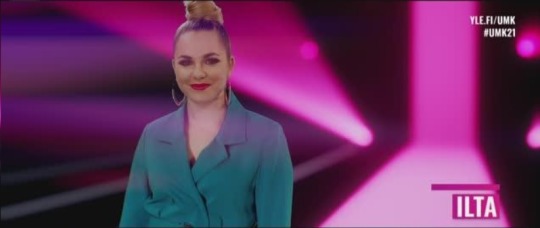
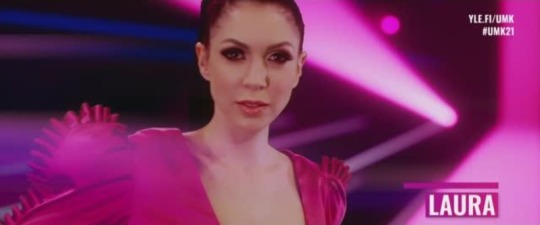
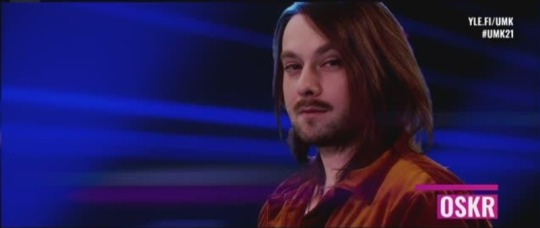
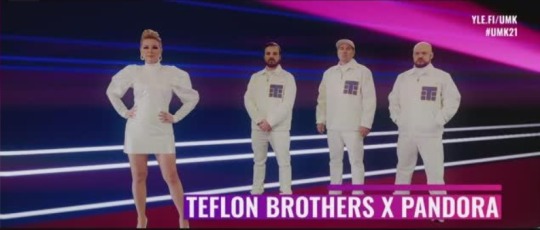
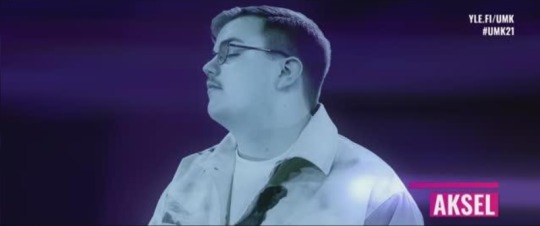
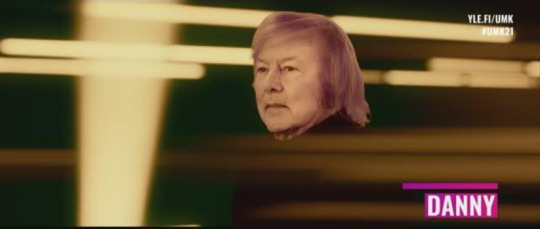

Songs will be revealed one per day, starting on Thursday the 14th of January. The final is on Saturday 20th of February at 8 pm CET.
Previous Eurovision connections: Laura (Põldvere) participated in Eurolaul 2005 both as a solo artist with the song Moonwalk and as a member of the girl group Suntribe. Suntribe represented Estonia in Kyiv with the song Let’s Get Loud. She also took part in Eurolaul 2007 with the song Sunflowers, Eesti Laul 2009 with the song Destiny and Eesti Laul 2016 with the song Supersonic. In 2017 Laura represented Estonia, again in Kyiv, in a duet with Koit Toome with the song Verona. She again took part in Eesti Laul in 2020 with the song Break Me.
Pandora has taken part in Melodifestivalen twice. In 2003 she competed with the song You and in 2004 with the song Runaway.
Aksel (Kankaanranta) won UMK 2020 with the song Looking Back.
Danny has competed in the Finnish Eurovision selection multiple times: in 1966 with the song Pieni sana, 1967 with Sua kutsun, Maarit and Keskiyöllä, 1973 with Galileo Galilei, 1974 with Jos maailmassa vain ois kahva, 1975 with Seikkailija, 1986 with Ninja and in 2004 with Seven Times Seven. (He has also dated Katri Helena (ESC 1979 & 1993) in 1967-1968 and Erika Vikman (UMK 2020) in 2016-2020.)
#umk#uuden musiikin kilpailu#umk 2021#uuden musiikin kilpailu 2021#eurovision#2021#euroviisut#ilta#laura põldvere#oskr#teflon brothers#pandora#aksel#danny#blind channel#esc#suomi#finland
25 notes
·
View notes
Text
Eurovision 2003 - Number 45 - Ruffus - "Eighties Coming Back"
youtube
It's Claire's Birthday! Seriously. Until shortly before EuroLaul 2003 Ruffus were called Claire's Birthday and had released three LPs in the early 2000s. They represent what is definitely a Baltic sensibility when it comes to Eurovision; a distinct soft alt or indie rock sound and attitude.
Eighties Coming Back is pure nostalgia encapsulated in gentle rock form. At this point in time, the 80s were not the flavour of the month. They had not yet come back. That was a least five years away - the thought of that era's return was unfashionable and the lyrics of the songs seem to convey that. The very thought inspires sleepless nights. Remembering the hairstyles conjures nausea and despondency. Yes kids, you're going to grow old. Then someone else's kids are going to rediscover your youth. They'll claim a remixed, subverted, artificial version of it as their own, and then it won't be yours any more. The whole song feels that malaise - the winding down at the end of a generation.
That's a bit too much of an existential crisis to be the norm for a Eurovision song and perhaps Ruffus did not expect to be here. They only won EuroLaul by a single point then could only reach 21st at Eurovision.
After their own identity crisis, the band split later in 2003. Lead singer Vaiko Eplik went solo and has released 16 subsequent albums at a rate of about one a year. He's also written two of the more celebrated EuroLaul and Eesti Laul entries in subsequent years. The rest of the band also stayed in the music industry. Bassist Ivo Etti joined Ewart and the Two Dragons, drummer Margus Tohver joined thrash metal band Palat, Siim Mäesalu went back into academia to study electronic music whilst Jaan Pehk turned to poetry but has been a guitarist in several other Estonian bands.
#Youtube#esc#esc 2003#eurovision#eurovision song contest#riga#riga 2003#national finals#Ruffus#Claire's Birthday#Estonia#EuroLaul 2003
4 notes
·
View notes
Text
Eurovision 2003 - Number 35 - Slobodan River - "What a Day"
youtube
Welcome to one Estonia's enduring Eurovision legends. Slobodan River is a certain Stig Rästa's first band. He's there, looking very young indeed. Together with another Eesti Laul Eurovision name, Tomi Rahula, producer of the entire competition from 2019 to 2023. Singing is Ithaka Maria aka Maria Rahula completing the band line-up.
For all of them, this is their first time preforming at Eurolaul, but Tomi and Maria have already had two songs competing as song-writers, and one of those songs was a certain Mere Lapsed sung by Koit Toome at Eurovision giving Estonia a 12th place finish in 1998
What a Day is a Baltic indie-pop banger plagued by so much dry ice you can barely make out the backing singers or the band through the mist. Lyrically, well, it's not so subtle. This appears to be a song about alfresco canoodling and woman who seduces the mind out of the subject of the song with her beach-based sexuality. It's... ...direct and to the point.
There are a lot of long-held notes in the chorus along with a heavy rhythmic pulse and a repeating, very standard four-bar chord progression. It's a song that has to move as fast a heart can pound while Maria cries over the top of it. Maria, her red hair and white outfit is not so much the focal point of the performance, as pretty much the only thing we get to see. She seems very pleased at the end of the song.
Maybe the lyrical content or the unrelenting central progression at the song's heart were what led to it only finishing joint 7th of the 10 songs competing at Eurolaul. Obviously this was not the end of the story for any of the band. All of them were back in 2004 as Slobodan River again, thereafter they entered again as individuals, members of new bands and even more often as song-writers. Stig made it to Eurovision stage in 2015, Tomi ran Eesti Laul through some of its more successful years and Maria went on to become Miss Estonia in 2018 at the age of 39 and as a mother of 3.
Before the split up in 2006, they did release one album, 2004's Surrounded featuring many of their best known songs including this one.
#Youtube#esc#esc 2003#eurovision#eurovision song contest#riga#riga 2003#national finals#Eurolaul 2003#Estonia#Slobodan River#Stig Rästa#Tomi Rahula#Ithaka Maria#miss estonia
2 notes
·
View notes
Text
Eurovision 2005 - Number 48 - Glow - "Dream"
youtube
Estonia's best-selling pop queens, Vanilla Ninja, had defected to another country for 2005. What could ETV do? Why not get their support band on Eurolaul? And as they've got them booked, why not have them enter two songs?!
Glow are that support band. They are Marta Piigli and Ketlin Hoel and they've been singing as a duo since 2004. They had a couple of hits since then, with appearances on several Estonian summer song compilations. The sound is pop-rock, with Marta and Ketlin's voice singing rock harmonies in front a slightly anonymous band of blokes.
Dream is a chugging rock song that harkens back to the 1970s. Not metal, but from an era when double denim was the epitome of rock styling. Marta and Ketlin have surprisingly powerful and deep voices, that work exceptionally well together. Strong and easily able to keep up with a standard rock band drum, bass and guitar instrumental. There's keen a touch of a growl and gravel in there. It feels as if this is barely a work out for them.
The song was written by Asko-Rome Altsoo and Raul Veemer who did work together on a previous Eurolaul song in 2003. Asko-Rome's day job is a studio engineer. Neither are noted performers or song-writers, so this feels like a happy marriage formed in a studio.
Despite the band's inexperience, this wasn't their only song in Eurolaul this year. Their other song was written by the band themselves, but could only finish eighth of the nine songs. Dreams was preferred, but even then it only managed seventh in the televoting, a long way short of sixth place.
Even though there's an element of Glow filling in for the absence of Vanilla Ninja - their relative lack of stage presence struggles to fill that void. This miss didn't put them off, as they returned to Eurolaul in 2006 with something more polished.
2006 was pretty much the end for the band. They split that year. Marta went on to a career in business and coffee-shop ownership while (possibly) briefly playing for Saku Sporting in the Estonian women's football league, although that's possibly another Marta Piigli of a similar age. Ketlin stayed in music for a little longer. She joined a all-female four piece called Star Sisters for a few more years of very similar songs and performances. There some solo releases later in 2014.
#esc 2005#esc#eurovision#eurovision song contest#Kyiv#Kyiv 2005#Youtube#national finals#Estonia#EuroLaul 2005#Glow#Vanilla Ninja#Marta Piigli#Ketlin Hoel#Asko-Rome Altsoo#Raul Veemer
2 notes
·
View notes
Text
Eurovision 2006 - Number 33 - Ines - "Iseendale"
youtube
Eda-Ines Etti is one of Estonia's most established singing stars of the 2000s and I'm a little surprised that she didn't feature in my 2000 countdown. I checked back and discovered that she got knocked out by Nightwish just before the last 64. Bad draw.
She rose to fame in the 1999 Kaks takti ette (Two Steps Ahead) TV programme that looked to discover young singing talent in the country. Ines finished second which in turn led to winning Eurolaul 2000 which got her to Eurovision and Estonia's best ever result with fourth place. A record that got beaten the next year when they won.
She was supposed to try again in 2002, but pulled out at the last minute for unspecified reasons. Her song was taken by Sahlene - who won Eurolaul and finished third at Eurovision with it. Truly Estonia's Eurovision glory era with Ines at the heart of it. However, she went missing for a couple of years, until albums appeared in 2004 and 2005. In 2005 she also co-hosted Eurolaul as well as taking part in advertising campaigns. By 2006, Ines's star was rising quickly again.
Eurolaul 2006 was therefore only her second appearance in the competition despite being someone closely connected to Estonia in Eurovision. The song she went with is Iseendale (To Himself), written by herself and her brother Ivo Etti (that's him on bass), who was a member of Ruffus in 2003 as well as now being a member of Ewart and the Two Dragons.
Iseendale is the only song from Eurolaul 2006 in Estonian and it's giving me pronoun problems. The song is addressed to a you - who seems to be Ines's partner in a relationship. He's a little selfish. Well a lot selfish. He has all the opportunities and he devotes himself to finding his path through life and his path only. Ines is committed to him, but doesn't even seem to be an afterthought. It's a song in which she seems to telling herself that this situation is not OK and that she should make a change.
That title I can find translated in two different ways. I think it's actually To Himself - which makes sense sort of in that it's a song addressed to a him. However, some places translate it as To Myself, which make more grammatical sense in English, but also makes it a song about Ines convincing herself to act. I prefer the second translation, but I think the first is probably correct.
The song has a Coldplay vibe about it. A piano used percussively and rhythmically stamping out the same pattern as the drums while moving the chords hither and thither in the chorus. The guitar is the element supporting the melody more, especially in the verses. Ines hits all the big notes with aplomb and conveys the emotional heft of the song while confronted head-on by a wind machine.
She came second. Only six points behind the winner - a winner that could only manage eighteenth in the Eurovision semi-final. Eurolaul was decided by an international jury this year. I think that jury did Estonia dirty. In 2007, the televoting returned.
The other thing that returned in 2007 was Ines to have one final crack at getting back to the Eurovision stage, so maybe she'll be back here. Outside of Eurolaul, there were three more albums to come over the next five years as well as many TV appearances, awards, and concerts. She is still singing and performing even if the recordings have ended. Here is Ines performing Taevasse (To Heaven) on TV channel Kanal 2 from late last year. Her vocals are still amazing.
youtube
#esc 2006#esc#eurovision#eurovision song contest#Athens#Athens 2006#Youtube#national finals#Estonia#Eurolaul 2006#Ines#Eda-Ines Etti#Ivo Etti
1 note
·
View note
Text
Eurovision 2004 - Number 39 - Slobodan River - "Surrounded"
youtube
They're back - the Ur band of Estonian Eurovision. After last year's experimentation with a televote at Eurolaul, ETV have flipped entirely and this year's competition is 100% televoted. Maybe the outcome of that advisory televote last year was chastening...
You would expect a band as big as well-known in Estonia as Slobodan River to benefit from that, but they are up against a couple of other big names in the competition, so they need a big song.
They've gone with Surrounded, a song about the final straw and telling him just get out. No more lines, excuses or threats, get out. There's an undercurrent of violence both in what lead singer Ithaka Maria has experienced and in what she'll do if her partner doesn't comply with her demand. The song is melodic pop-rock with alternative slant, and given the lyrics, is somewhat non-angry. It's a sing along fun song with an upbeat lilt.
This is all a bit Abba in fact. Even more so because Ithaka Maria and guitarist Tomi Rahula have been married for a while. In fact they've been a couple since she was 13 and he was 16 at high school in 1993. The band was formed with them at the centre with Maria writing many of the songs - this is one of hers. Slobodan River in 2004 are actually having their best year with their album (also called Surrounded) yielding many singles that got to the upper ends of the Estonian charts.
The band split two years later in 2006. Maria and Tomi divorced five years later in 2011. They all went on to much national success in different arenas (as I outlined in for their 2003 song What a Day). That makes this the last time that Slobodan River appeared together in the Estonian national final, but they'd all be back again either solo, as song-writers, in other bands or even as the producer for the entire show! I have no doubt that this blog bit will be linked to many times in the future.
#esc#esc 2004#eurovision#eurovision song contest#istanbul#istanbul 2004#Youtube#national finals#eurolaul 2004#Estonia#Slobodan River#Ithaka Maria#Tomi Rahula#Stig Rästa
2 notes
·
View notes
Text
Eurovision 2005 - Number 7 - Vanilla Ninja - "Cool Vibes"
youtube
Switzerland is in its mercenary era. Ditch the national final and pick the bands and singers that maybe should have won a different country's national final in a previous year. Vanilla Ninja won the televote in Eurolaul 2003 - but that didn't count in a 100% jury voted final. SRG SSR go zoink! It helped that in the two years between their Eurolaul appearance and representing Switzerland at Eurovision that they had become a huge band across Central Europe.
There were some complaints. Not just in Estonia, but also in Switzerland. The broadcaster countered that the song was co-written by Swiss born song-writer David Brandes (alongside Jane Tempest). Except that he spent most of his life in Germany, had written the German entry to this year's Eurovision and was embroiled in a controversy entirely of his own making. That scandal was serious enough for Vanilla Ninja to distance themselves from him, as all of the songs he wrote and produced (including this one) had been banned from the German charts.
Then bassist and original lead singer, Maarja Kivi left the band after becoming pregnant, and her replacement, Triinu Kivilaan was only fifteen years old. That cause some consternation too, especially as she'd lied and claimed she was seventeen. Fortunately, her sixteenth birthday was before Eurovision and thus all rules were satisfactorily obeyed in the eyes of the EBU.
Cool Vibes is a very Vanilla Ninja song. Rocky, spiky even if it starts out orchestrally with strings and a vocal that could have mutated into a ballad. After that first chorus though all the guitars are unleashed. It's full blast Marshall amplified fuzz. A full four of the six allowed people on stage are pretending to play guitars. The strings haven't entirely disappeared and do re-emerge for the bridge.
It's a song about living on the edge. The edge between reality and fantasy. About wanting the thrill of danger and pushing away the reality of it. The guitars say that the thrill will probably win, but who's to say exactly what the outcome's going to be? This role-playing lyrical suggestiveness was written by long time Ralph Siegel lyricist John O'Flynn/Bernd Meinunger/Gunter Johansen who has written eighteen Eurovision entries starting with the one about that other dangerous man, Dschinghis Khan.
The whole thing was Eurovision catnip of the highest order. Vanilla Ninja qualified safely from the semi-final, although only in eighth place. For a time in the final they sat at the top of the scoreboard, only relinquishing that position just before the halfway mark. They ended up in eighth place, which was Switzerland's best result since 1993 and Annie Cotton
For Vanilla Ninja, Eurovision 2005 was at the high watermark of their fame. Triinu left the band as quickly as she'd arrived later in the year. The others continued as a three piece. As they'd ditched their manager and producer, their label also ditched them and they had a period of antagonism with their promoters. They did find a new team and continued. Their Central European connection suffered, but they remained hugely popular in Estonia entering Eurolaul again in 2007. They have toured Asia, won the Silver Seagull at the Viña del Mar Festival in Chile, but after 2008 they went on an extended musical hiatus.
Recently, in 2021, the band have reformed including Triinu and released more music.
#esc 2005#esc#eurovision#eurovision song contest#Kyiv#Kyiv 2005#Youtube#Switzerland#Vanilla Ninja#David Brandes#John O'Flynn
1 note
·
View note
Text
Eurovision 2004 - Number 30 - Kerli Kõiv - "Beautiful Inside"
youtube
This is not Kerli's first appearance in my top lists - she made it in last year. It is however her first appearance in her native Estonia. Eurolaul 2004 had several Estonian favourites appearing, including Kerli. The competition would be tough.
Beautiful Inside is a marked contrast with Kerli's song at Melodifestivlen in 2003. That was a Spice-Girls-lite bop about a girl and her attitude. It was upbeat and fun with Kerli smiling her way through it. This is a downbeat, grungy, rockier number with Kerli trying to fend off negativity both from outside and from within. Kerli wants the world around her to leave her alone so that she can recover her calm, and at least some positivity.
It's a desperate, moody plea for control of her own thoughts. Although this style of girl rock was increasingly common in the charts all over Europe (and had been for a few years), this was not a genre of music, or a subject for a song that had any presence on the Eurovision stage. Grunge-pop was almost the antithesis of Eurovision. Dull not flamboyant. Introspective not extrovert. Downbeat not celebratory. Yet there is no denying that Kerli and Beautiful Inside fit with Eurolaul and with non-Eurovision mood of the moment.
It struck a chord with the Estonian public. It beat all of the songs from equally big name stars, perhaps because of its authenticity and representation of a whole group of music fans normally excluded from the Eurovision bubble. But it wasn't enough. It finished second, some distance behind something a whole lot folkier and Eurovision compliant.
There was another first going on here. Beautiful Inside was the debut of Timo Vendt as a song-writer at Eurolaul. He's a saxophonist and producer, now turning his hands to composing. He would go on to write two Eurovision entries for Estonia, including one that is not only one of Estonia's most celebrated entries ever, but is vastly different in style, genre and subject matter to Beautiful Inside.
Kerli, of course, would try again. At this point, she's in a career low. The money is running out and when not performing at Eurolaul, she's living in Sweden in an abandoned house, living off rice and sleeping on a camp bed. Better things would lie ahead, but for now Kerli is bit of a dark place.
#esc#esc 2004#eurovision#eurovision song contest#istanbul#istanbul 2004#Youtube#national finals#Estonia#Eurolaul 2004#Kerli Kõiv#Timo Vendt
1 note
·
View note
Text
Eurovision 2003 - Number 28 - Kerli featuring Locatellis - "Let's Go"
youtube
2003 marks the debut of one of the National Final fan's favourites. Welcome to Kerli Kõiv, not competing at EuroLaul for her first attempt to make it, but at Melodifestivalen. Here she's paired with female rap duo Locatellis to form a cut-down, Spice Girls influenced, manufactured experience with a smattering of Spanish.
Let's Go may be a derivative and absolutely off-the-production-line party song, but it's addictive and all three of them seem to be having huge amounts of fun on stage. Interestingly the song is written in part by Jonas Liberg - the creative brain behind Latvia's 2008 Eurovision entry Wolves of the Sea
It's a calling card for Kerli (she is on the line after all) and it's certainly one that got her noticed. However the televoters of Sweden were less impressed. It came 7th out of the 8 songs in Heat 2. Not a great start, but the A&R men were watching as were the folks back home in her native Estonia.
In 2004 she entered EuroLaul and finished second with a song that pushed ever further into the public eye. Shortly after that she signed her first record deal - with Def Jam records of all record companies. Her aesthetic was indie. Skater girl at the peak years of Avril Lavigne. Her focus was then away from Estonia and Sweden and more about what her label wanted her to do - which wasn't what she wanted at all. Many singles and an album followed before she wriggled free from Island/Def Jam and got fully back in control of her music.
Her entries to Eesti Laul resumed in 2016 and was almost instantly making an impression again. I'm certain she'll be in a future top 48. For now here's one of her covers from the Island/Def Jam years - a cover of Bauhaus's She's in Parties from 2007
youtube
#Youtube#esc#esc 2003#eurovision#eurovision song contest#riga#riga 2003#national finals#Melodifestival 2003#Kerli Kõiv#Kerli#Locatellis#Jonas Liberg#Sweden
1 note
·
View note